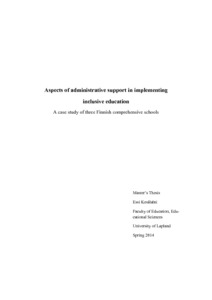Aspects of administrative support in implementing inclusive education : a case study of three finnish comprehensive schools
Kesälahti, Essi (2014)
Kesälahti, Essi
Lapin yliopisto
2014
openAccess
Julkaisun pysyvä osoite on
https://urn.fi/URN:NBN:fi:ula-201406241330
https://urn.fi/URN:NBN:fi:ula-201406241330
Tiivistelmä
Inclusive education is about all learners having a right to go to their local schools and receive support in learning there, instead of placing some learners in special schools and classrooms. It is a question of equality and human rights. In Finland, equality is highly appreciated, but the municipalities have differences in the implementation of inclusive education. Administration plays a role in supporting the implementation of inclusive education; however, inclusion requires changes to the whole educational organisation.
The purpose of this study is to find out how inclusive education is implemented and how the administration supports it. This is a qualitative case study of three comprehensive schools in one Finnish municipality. The data have been collected from principals, teachers, administrators and decision makers. Official documents serve as additional sources. The research data have been analysed by using theory-guided content analysis.
The research shows that inclusive education is implemented in schools in diverse ways. The teachers and principals seem to be open to try courageously new methods and solutions. The role of the administration is to create a working culture and resources so that this is possible. In addition, there needs to be firm guidance in the legislation and curricula since they provide the framework for school work. It also seems that knowledge and understanding, in addition to the right attitude is needed at every level of the educational organisation. Overall, a flexible organisational structure, openness to learning and development and a few pioneers to lead the change are needed.
The purpose of this study is to find out how inclusive education is implemented and how the administration supports it. This is a qualitative case study of three comprehensive schools in one Finnish municipality. The data have been collected from principals, teachers, administrators and decision makers. Official documents serve as additional sources. The research data have been analysed by using theory-guided content analysis.
The research shows that inclusive education is implemented in schools in diverse ways. The teachers and principals seem to be open to try courageously new methods and solutions. The role of the administration is to create a working culture and resources so that this is possible. In addition, there needs to be firm guidance in the legislation and curricula since they provide the framework for school work. It also seems that knowledge and understanding, in addition to the right attitude is needed at every level of the educational organisation. Overall, a flexible organisational structure, openness to learning and development and a few pioneers to lead the change are needed.
Kokoelmat
- Pro gradu -tutkielmat [4960]
